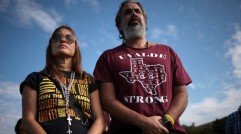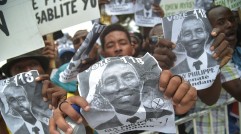US Marine Cpl. Wassef Hassoun Found Guilty of Desertion After Claiming Abduction, Fleeing to Lebanon
A U.S. Marine corporal has been found guilty of desertion by a military court for his two disappearances in 2004 and 2005. The corporal claimed insurgents had abducted him in 2004, but when he returned to the U.S. he fled to Lebanon for almost a decade to avoid trial.
Cpl. Wassef Hassoun was found guilty of desertion and the loss of his government-issued firearm on Monday, according to the Associated Press. Cpl. Hassoun faces two years and five days for his two desertions. He will be credited for the eight months he spent in pre-trial confinement.
Judge Marine Maj. Nicholas Martz at Camp Lejeune ruled Cpl. Hassoun would be demoted, lose his pay and be dishonorably discharged. He could have faced a maximum of 27 years but he was found not guilty of a separate theft charge and one of the three specifications concerning his desertion charge.
The case surrounding Cpl. Hassoun has been complicated and, at times, unclear. In 2004, Cpl. Hassoun allegedly deserted his unit fighting in Fallujah. He later appeared on a video in which insurgents claimed to have abducted him. His family in Lebanon allegedly negotiated his release and he then reported back to the U.S. embassy in Beirut.
However, his fellow Marines in his unit claim Cpl. Hassoun had expressed discontent with his time in Iraq. Following an investigation, the Marines decided to charge him with desertion in January 2005 but he then fled again to Lebanon where he stayed for nine years.
However, his lawyer Haytham Faraj argued his client "never got the benefit of the doubt because of his ethnicity," according to the New York Times.
"Bergdahl's family was invited to the White House. My client was told he could face life in prison," he told the newspaper over the phone.
He explained there was evidence to support Cpl. Hassoun's claims, including some personal documents found in a house associated with insurgents.
Faraj also explained Cpl. Hassoun's family negotiated his release on the terms that he would not return to the Marines.
The military attaché at the embassy, Col. Robert Carnahan, corroborated Cpl. Hassoun's claims, testifying that his family "had alerted the embassy about their negotiations."
Col. Carnahan added that when Cpl. Hassoun returned to service, the supposed insurgents burned two of the family's businesses.
Although initially charged with desertion during a time of war, the charge was reduced to desertion. Cpl. Hassoun also pled guilty to an authorized absence for his 2005 trip to Lebanon.
Subscribe to Latin Post!
Sign up for our free newsletter for the Latest coverage!
* This is a contributed article and this content does not necessarily represent the views of latinpost.com














